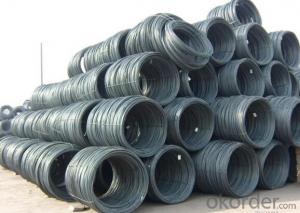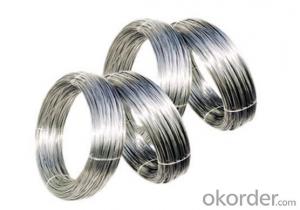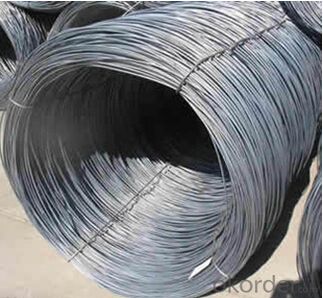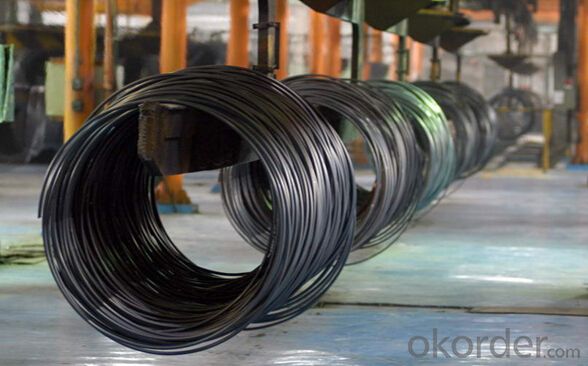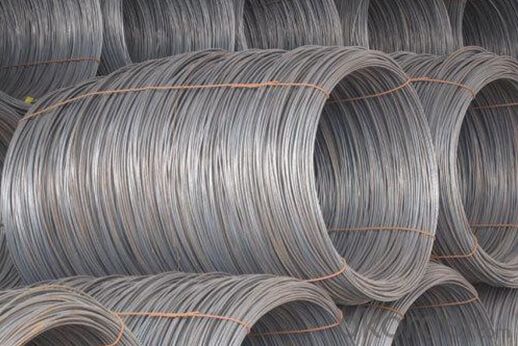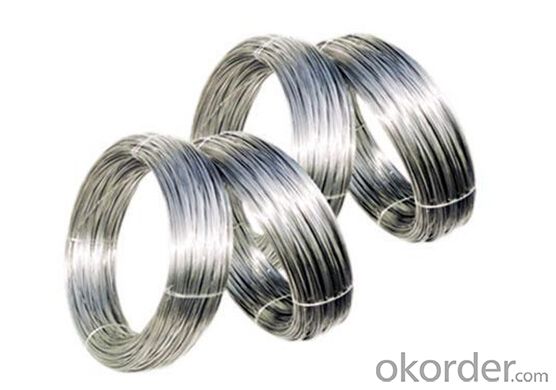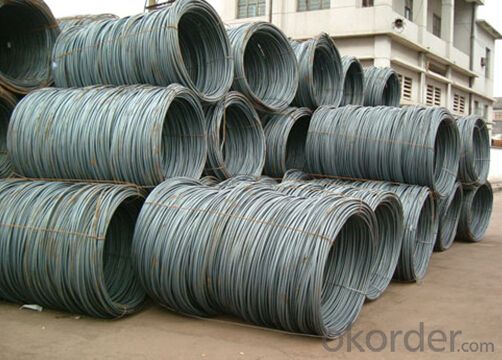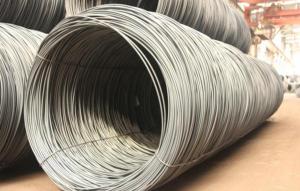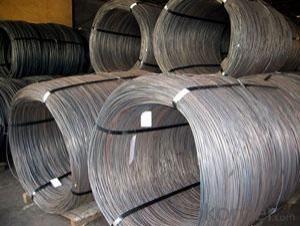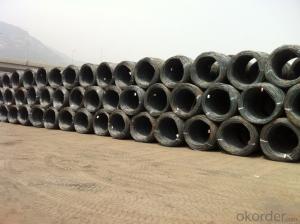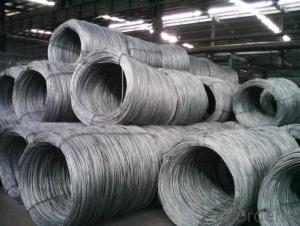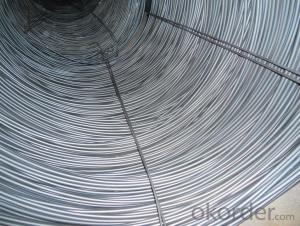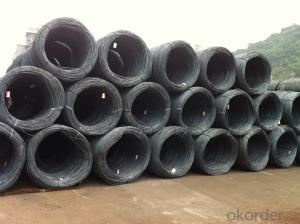Wire Rod Grade CNBM SAE1008B-1012B-1018B-1022B
- Loading Port:
- Tianjin
- Payment Terms:
- TT OR LC
- Min Order Qty:
- 25 m.t.
- Supply Capability:
- 10000 m.t./month
OKorder Service Pledge
OKorder Financial Service
You Might Also Like
Specification
High Quality Wire Rod-SAE1008B/1012B/1018B/1022B
Specification
Steel Grade: | SAE | Standard: | AISI,ASTM,BS,DIN,GB,JIS | Wire Gauge: | 5.5--1.4mm |
Place of Origin: | China (Mainland) | Type: | Drawn Wire | Application: | Manufacturing |
Alloy Or Not: | Is Alloy | Model Number: | 1082B 77B | Brand Name: |
|
Grade: | SAE 1006B SAE 1008B SAE1018B | Pack:: | in coils, in bundles | Coil weight:: | 2000kg-3000kg |
Size:: | 5.5mm 6.5mm 8mm 10mm 12mm 14mm 16mm | Chemical: | High carbon; Low carbon | Surface:: | Round, no twisted, light and smooth |
Dia tolerance:: | +/-0.3mm |
|
|
|
|
Chemical Composition
Grade | Chemical Composition(%) | |||||
C | Mn | Si | S | P | Cr | |
SAE1006B | 0.03~O.07 | ≤0.32 | ≤0.30 | ≤0.045 | ≤0.040 | 0.3-0.35 |
Mechanical properties | ||||||
Yield strength(N/mm2) | Tensile strength(N/mm2) | Elongation(%) | ||||
250-280 | 350-380 | ≥32 | ||||
Grade | Chemical Composition(%) | |||||
C | Mn | Si | S | P | Cr | |
SAE1008B | 0.10max | 0.3~O.50 | 0.15max | 0.050max | 0.040 max | 0.3-0.35 |
Mechanical properties | ||||||
Yield strength(N/mm2) | Tensile strength(N/mm2) | Elongation(%) | ||||
≥195 | 315-430 | ≥30 | ||||
Company Information
CNBM International Corporation is the most import and export platform of CNBM group(China National Building Material Group Corporation) ,which is a state-owned enterprise, ranked in 270th of Fortune Global 500 in 2015.
With its advantages, CNBM International are mainly concentrate on Cement, Glass, Iron and Steel, Ceramics industries and devotes herself for supplying high quality series of refractories as well as technical consultancies and logistics solution.
After-sale service | CNBM provides the services and support you need for every step of our cooperation. We’re the business partners you can trust; you can relax and get on with doing business. |
For any problem, please kindly contact us at any your convenient time, we’ll reply you in our first priority within 24 hours | |
Advantages | Industry experience over 20 years. |
Shipment of goods -More than 70 countries worldwide. | |
The most convenient transport and prompt delivery. | |
Competitive price with best service. | |
High technical production line with top quality products. | |
High reputation based on best quality products. |
Products Show
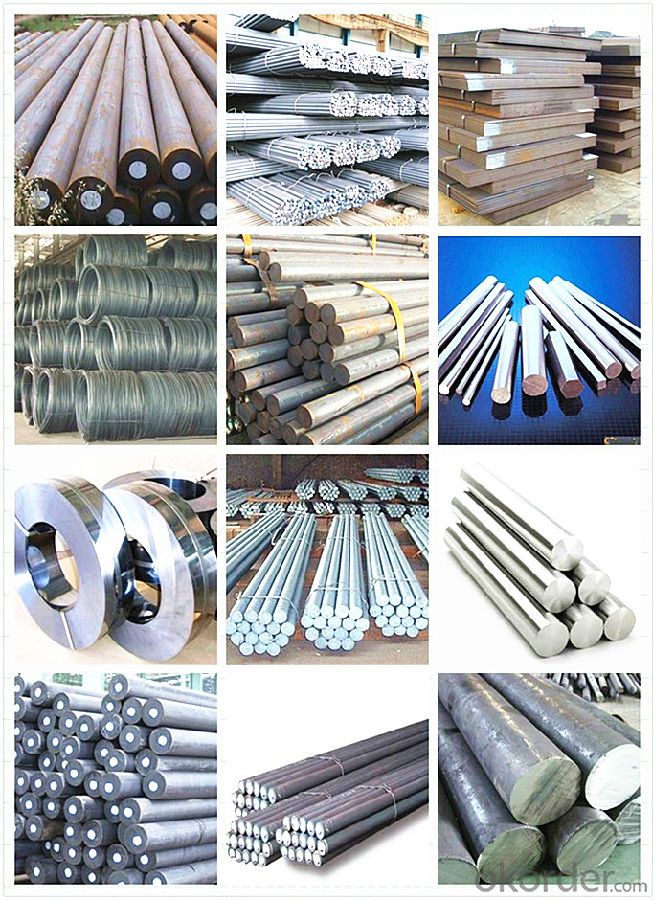
FAQ
Are you a trading company or manufacturer? | Manufacturer |
What’s the MOQ? | 3 metric ton |
What’s your delivery time? | 15-35 days after downpayment received |
Do you Accept OEM service? | Yes |
what’s your delivery terms? | FOB/CFR/CIF |
What's the Payment Terms? | 30% as deposit,70% before shipment by T/T |
Western Union acceptable for small amount. | |
L/C acceptable for large amount. | |
Scrow ,Paybal,Alipay are also ok | |
Why choose us? | Chose happens because of quality, then price, We can give you both. |
Additionally, we can also offer professional products inquiry, products knowledge train (for agents), smooth goods delivery, excellent customer solution proposals. | |
What's your available port of Shipment? | Main Port, China |
What’s your featured services? | Our service formula: good quality+ good price+ good service=customer's trust |
Where are your Market? | Covering more than 160 countries in the world |
- Q: How does special steel contribute to reducing product costs while maintaining quality?
- Special steel contributes to reducing product costs while maintaining quality through several ways. Firstly, special steel is known for its excellent strength and durability, which allows manufacturers to design products with thinner and lighter components. This reduction in material usage directly leads to cost savings without compromising on quality. Additionally, special steel possesses unique properties such as corrosion resistance, heat resistance, and wear resistance. By using special steel, manufacturers can create products that have a longer lifespan and require less maintenance or replacement. This not only reduces the overall cost of ownership for customers but also enhances the reputation of the brand for delivering reliable and high-quality products. Furthermore, special steel often allows for improved manufacturing processes, such as easier machinability or better weldability, which can result in increased efficiency and reduced production time. These time and cost savings can be passed on to the customers, making the final product more affordable without sacrificing quality. In summary, special steel's strength, durability, unique properties, and improved manufacturing processes contribute to cost reduction while maintaining or even enhancing product quality.
- Q: How does special steel contribute to the medical aftermarket industry?
- Special steel plays a crucial role in the medical aftermarket industry by providing high-quality materials for the manufacturing of various medical devices and instruments. Its unique characteristics, such as corrosion resistance, high strength, and biocompatibility, enable the production of durable and long-lasting equipment like surgical instruments, implants, and prosthetics. The use of special steel ensures the safety and effectiveness of these medical products, ultimately contributing to improved patient outcomes and advancements in healthcare.
- Q: How is stainless tool steel used in the manufacturing of surgical instruments?
- Stainless tool steel is commonly used in the manufacturing of surgical instruments due to its desirable properties such as high corrosion resistance, durability, and ease of sterilization. It provides the necessary strength and precision required for surgical tools, ensuring their longevity and performance in various medical procedures. Additionally, stainless tool steel can withstand repeated exposure to sterilization methods like autoclaving, making it a reliable choice for surgical instrument manufacturing.
- Q: How is ultra-high-strength alloy steel used in the aerospace industry?
- Ultra-high-strength alloy steel is extensively used in the aerospace industry due to its exceptional strength-to-weight ratio. It is commonly employed in the manufacturing of aircraft components such as landing gear, engine mounts, and structural parts. This steel's remarkable strength helps enhance the overall structural integrity of aircraft, ensuring they can withstand extreme conditions and stresses encountered during flight. Additionally, its lightweight nature contributes to reducing the weight of the aircraft, which in turn improves fuel efficiency and increases payload capacity.
- Q: What is the role of special steel in the automotive industry?
- Special steel plays a crucial role in the automotive industry by providing high strength, durability, and resistance to wear and corrosion. It is used in various components such as engine parts, chassis, suspension systems, and safety features. Special steel helps enhance the overall performance, safety, and fuel efficiency of vehicles, making it an essential material for the automotive industry.
- Q: How does special steel perform in high-temperature oxidation resistance?
- Special steel is specifically engineered to possess exceptional resistance to oxidation at high temperatures. This kind of steel incorporates alloying components like chromium, aluminum, and silicon, which generate a protective layer of oxide on the surface when subjected to extreme heat. This oxide layer acts as a barrier, preventing further oxidation and corrosion of the steel. The capacity of special steel to withstand high-temperature oxidation is of utmost importance in scenarios where the material is exposed to intense heat and oxidation, for instance, in gas turbines, heat exchangers, and furnaces. The protective oxide layer aids in preserving the strength and integrity of the steel, even under rigorous conditions. Moreover, special steel also showcases remarkable resistance to creep at high temperatures. Creep refers to the gradual distortion of a material under a consistent load and elevated temperatures. The distinctive composition of special steel grants it the ability to resist creep deformation, thereby enhancing its overall performance and dependability in environments with high temperatures. In conclusion, special steel exhibits exceptional performance in terms of resistance to high-temperature oxidation due to its alloying elements and the formation of a protective oxide layer. Its capability to resist oxidation and maintain its structural integrity at elevated temperatures makes it the preferred choice for numerous industrial applications.
- Q: Can special steel be used in the production of medical implants?
- Medical implants can indeed utilize special steel materials. Examples of these special steels include stainless steel, titanium alloy, and cobalt-chromium alloy. These steels possess unique properties that make them suitable for medical purposes. Notably, they are biocompatible, meaning they do not cause any adverse reactions or toxicity within the human body. Additionally, they exhibit high strength, corrosion resistance, and the ability to withstand the harsh conditions found inside the human body. Consequently, special steels can be employed in the production of various medical implants, such as orthopedic implants like hip and knee replacements, dental implants, cardiac stents, and surgical instruments. By incorporating special steel into medical implants, durability, longevity, and biocompatibility are ensured, thus providing patients with a dependable choice to enhance their quality of life.
- Q: How are cobalt-based alloys used in dental applications?
- Cobalt-based alloys are commonly used in dental applications due to their high strength, corrosion resistance, and biocompatibility. These alloys are used in dental prosthetics, such as crowns, bridges, and dentures, to provide durability and stability. Additionally, cobalt-based alloys are often used in orthodontic appliances, implants, and surgical instruments due to their excellent mechanical properties and resistance to wear and deformation.
- Q: What are the different methods for improving the corrosion resistance of special steel?
- There are several methods for improving the corrosion resistance of special steel. 1. Alloying: One of the most common methods is to add alloying elements to the steel composition. These elements, such as chromium, nickel, and molybdenum, form a protective layer on the surface of the steel, preventing corrosion. Stainless steel, for example, contains a high amount of chromium, which forms a passive film that protects the steel from corrosive environments. 2. Surface treatments: Various surface treatments can be applied to special steel to enhance its corrosion resistance. These treatments include electroplating, hot-dip galvanizing, and chemical passivation. Electroplating involves coating the steel with a layer of metal, such as zinc or nickel, which acts as a sacrificial anode, protecting the steel from corrosion. Hot-dip galvanizing involves immersing the steel in molten zinc, forming a durable, corrosion-resistant coating. Chemical passivation involves treating the steel with a solution that removes surface impurities and forms a protective oxide layer. 3. Protective coatings: Applying protective coatings can significantly improve the corrosion resistance of special steel. Coatings such as paint, epoxy, or polyurethane can act as a barrier, preventing moisture and corrosive substances from coming into contact with the steel surface. These coatings can be applied by spray, dip, or powder coating methods. 4. Heat treatment: Heat treatment can modify the microstructure of special steel, improving its corrosion resistance. Processes such as annealing, quenching, and tempering can alter the steel's properties, making it more resistant to corrosion. Heat treatment can also relieve internal stresses, which can contribute to corrosion. 5. Environmental control: Controlling the environment in which the special steel is used can also help improve its corrosion resistance. This includes measures such as maintaining proper humidity levels, controlling pH, avoiding exposure to corrosive chemicals, and implementing effective ventilation systems. By minimizing the exposure of special steel to corrosive elements, its corrosion resistance can be enhanced. Overall, a combination of these methods can be employed to improve the corrosion resistance of special steel, ensuring its longevity and performance in corrosive environments.
- Q: What are the main challenges in welding special steel?
- The main challenges in welding special steel typically include issues such as high heat input requirements, susceptibility to cracking, and the need for precise preheating and post-weld heat treatment. Additionally, the presence of alloying elements in special steel can make it more difficult to achieve the desired mechanical properties and require careful selection of filler materials.
Send your message to us
Wire Rod Grade CNBM SAE1008B-1012B-1018B-1022B
- Loading Port:
- Tianjin
- Payment Terms:
- TT OR LC
- Min Order Qty:
- 25 m.t.
- Supply Capability:
- 10000 m.t./month
OKorder Service Pledge
OKorder Financial Service
Similar products
Hot products
Hot Searches
Related keywords
